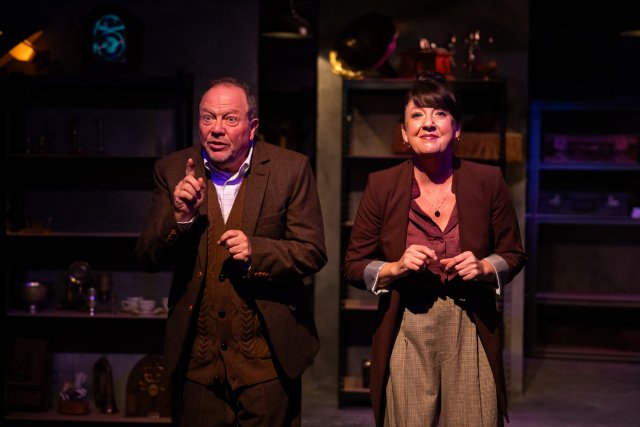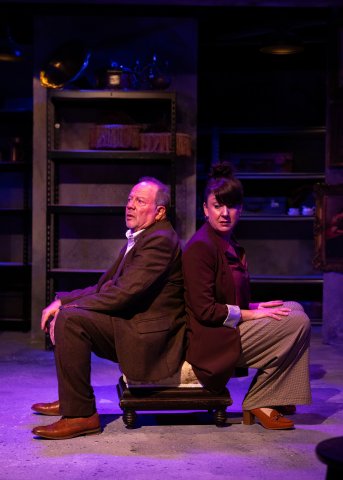The Berlin Diaries
Rolling World Premiere at South Florida's Theatre Lab
By: Aaron Krause - Nov 29, 2023
Playwright Andrea Stolowitz found lost relatives as she developed her autobiographical play, The Berlin Diaries.
And now, while watching the funny and moving piece, you have the chance to be among the first audience members to learn how she did so and celebrate with her.
As part of the National New Play Network Rolling World Premiere program, The Berlin Diaries is experiencing its stage debut as an impressive fully-staged production at Theatre Lab, the professional resident company of Florida Atlantic University (FAU). Theatre Lab is in residence at FAU’s Boca Raton campus.
Local live theater talents Avi Hoffman and Niki Fridh each take on 14 characters, often switching roles one line at a time. And they shine while doing so, under Matt Stabile’s sensitive direction, smart staging, and pacing. Stabile is Theatre Lab’s Artistic Director.
The theater company, one of the only ones in Florida dedicated exclusively to developing new plays, is staging The Berlin Diaries through Dec. 10. Then, it will experience separate world premiere productions at companies in Indiana and New York as part of the Rolling World Premiere program (https://nnpn.org/rolling-world-premiere.)
Certainly, The Berlin Diaries is a relatable and timely piece because, among other reasons, it centers on the Holocaust. However, it is not just another Holocaust play, written like ones that preceded it.
Rather, Stolowitz has written the surprisingly humorous work almost like a detective story. In it, she travels to Germany to unearth details about her past, specifically relatives she never knew she had. She learns about them through a diary that her great-grandfather wrote.
The relative, Max Cohnreich, penned the diary at some point before or after escaping Nazi-controlled Germany in 1939 and emigrating to New York.
Flash forward 71 years, to 2010. At that point, an archivist from the United States Holocaust Museum informs Stolowitz that the institution just received the diary, donated by her mother. And it isn’t long before the writer is aboard a plane to Berlin, Germany. There, she will try to solve a mystery, learn a shocking secret, track down relatives she never knew she had, and connect with at least a couple of them. In the process, she will learn how important family was to her great-grandfather. He, perhaps, will become more alive to her than any of her living relatives with whom she regularly interacts. Indeed, such is the power of the written word.
In fact, such power becomes obvious while watching “The Berlin Diaries.” In addition to using irresistible humor (something called “The Hemorrhoid Poem” is part of the diary,) Stolowitz writes vividly; we can, at times, form a mental picture from the words she uses. In addition, her work features bold theatricality whether she is writing an intimate portrayal of the human condition or examining the intersection of national history on private lives.
This much is certain: The humor never belittles or disrespects the serious themes. Rather, the comedy disarms us, so that when it comes time to hit us with heavy material, we are less guarded. As the elderly character Moishe tells Stolowitz: “Well you know, you’re a playwrighter. You got to make ‘em laugh first. Then they can cry.”
In “The Berlin Diaries,” the personal intersects with the historical, while the particular meets the universal. Indeed, the effect of history on individuals and families is something that the playwright examines in “The Berlin Diaries.” Meanwhile, themes such as connection, family, history, and discovery play out in the piece. Stolowitz also asks some relevant questions, such as why are some families distant?
Of course, let’s not discount the importance of the fact that the play deals with the Holocaust and is being produced today, in 2023. We are living in a world that has just experienced a deadly attack in Israel, leading to war and abductions. And the amount of anti-Semitism, which was already widespread, has only increased. Also, with the number of Holocaust survivors and witnesses greying and dying, many feel it is important to preserve facts, anecdotes, and memories so that the world will never forget the Holocaust’s horrors.
But again, while the play deals with the Holocaust, it is different than many plays. In particular, Stolowitz has written “The Berlin Diaries” using a non-traditional method. For example, the actors play each other’s characters, such as in the following exchange. Here, Stolowitz, who is a character in her own play, is speaking to someone else.
Andrea: Just wanted to touch base before I land in Berlin. Yeah.
Andrea: Well hope to see you soon.
Andrea: Sorry we didn’t find each other on the beach.
Andrea: Hopefully next time.
Andrea: Hopefully next time.
In the aforementioned, Fridh says the bolded lines as Stolowitz, while Hoffman speaks the lines that are in plain text, also as Stolowitz. By employing this format, the playwright reinforces the drama of scenes, especially those that carry a high sense of urgency. Our heads dart from side to side like ping pong balls as we turn to one performer and then immediately the other, back again, and so forth. At times, the passages are short, no more than a handful of words. Further, the performers deliver them in a rapid-fire exchange, enhancing the drama or comedy. That is not so much the case in the above passage. It could exist without repeating the line “Hopefully next time.” Honestly, its repetitive and lacks variety.
Stolowitz’s experimentation with form works to greater dramatic effect in the following. The passage recounts the time suspects shot through the window of the Stolowitz home in North Carolina, apparently mistaking the residence for another.
Andrea: Pop. Pop.
Andrea: Something comes through the window. I throw myself on top of (my young son).
Pop. Pop.
Andrea: We wait.
Of course, it’s a riveting passage, and anybody who has a family or cares for fellow humans will relate. With that said, Stolowitz could have excluded the scene and it would not have hurt the play. Frankly, part of the exchange throws us off because it suddenly switches from one topic to another. This might have been part of Stolowitz’s unorthodox manner of writing the play, but it did not work for at least this critic.
In the scene, the archivist for the United States Holocaust Museum is listing the institution’s address.
Immediately after, Andrea tells us that “we move to this house suddenly because the last house we live at, 604 Gattis Street, Durham, NC, 27705 is the target of a drive-by shooting.
In addition to spoken words, projection designer Harmon Casey has included visuals that help tell the story. For instance, at one point, Stolowitz says that she gathered a large number of papers through her research in Berlin. The visual that follows this line shows us how large of a collection the playwright amassed.
Other visuals do not work as well. Namely, it seems useless to have a character recite an address and then list that address through a projection. Why not include a photo of the location instead?
But except for the play’s and this production’s few shortcomings, there is much to praise about the piece and Theatre Lab’s production.
For example, Stabile positions the actors in ways that make sense, and the pacing is varied but never too slow or too fast. The production runs about an hour and a half without an intermission, and it never dragged during opening night. When the speed is faster, it reinforces the drama and urgency but does not make it hard to follow.
Also behind the scenes, scenic designer Alyiece Moretto Watkins has created a stately-looking room with neatly arranged shelves of artifacts, collectibles, keepsakes, or heirlooms. All scenes take place here, with other locations suggested. Are we in a museum? Or, perhaps, an attic of an expensive home holding valuable items? The production never specifies the exact location and perhaps it should have. What is clear is that someone with taste and class has collected many valuable items and cares about the place’s appearance enough to carefully organize it.
Meanwhile, lighting designer Eric Nelson skillfully illuminates the actors and scenery. During scenes of memory or tender moments, the lighting is appropriately dim. Contrastingly, during a realistic scene that takes place at the beginning of Spring, the lighting is understandably brighter.
Costume designer Dawn C. Shamburger’s period outfits are tasteful and striking. She has included details such as a black hat for an elderly man who appears at a Berlin synagogue.
Credit must also go to movement coach Nicole Perry. She has the performers moving gracefully and differently while playing elderly folks. Meanwhile, dialect coach Kathryn Johnston has helped the performers speak as though they were really German. And sound designer Matt Corey, in addition to creating, realistic-sounding noises, ensures that we can understand every word the performers utter (it helps, of course, that Theatre Lab’s playing space is intimate, allowing us to more powerfully experience emotions).
To play foreign, elderly characters, the performers merely lean forward a bit and speak in convincing accents. Other details, such as age makeup, are left to our imagination. And that is a wise decision, since live theater forces us to use our imagination more so than television or film.
The actors portray everybody from Stolowitz’s mother to a South African cousin to a German archivist. And, to their credit, Fridh and Hoffman create distinct, believable characters and segue seamlessly from one to another.
Hoffman is a world-renowned performer who has received many accolades. Among other accomplishments, he was inducted into the Bronx Jewish Hall of Fame for his lifetime work advancing Jewish culture, Yiddishkayt, and Holocaust Awareness through the charity he founded – Yiddishkayt Initiative (https://yilovejewish.org).
Certainly, Hoffman can identify with this play; he is the offspring of Holocaust survivors. And he imbues his characters with a sincerity and eloquence that is impressive. In addition to demonstrating impressive naturalism, Hoffman excels at speaking slowly, with feeling, and emphasizing the correct words.
While each character that he portrays is different, Hoffman believably imbues the diarist, Stolowitz’s great-grandfather, with a tenderness and loving quality that endears him to us immediately.
Fridh, herself a prolific, multi award-winning performer, lends the playwright a determined, urgent aura. You sense from Fridh’s performance that Stolowitz is ambitious and when she commits to a project, she sticks to it with persistence. Fortunately, Fridh also makes Stolowitz a likable, relatable character whom we wouldn’t mind getting to know.
Perhaps, someday, you may get to meet Stolowitz. For now, you can marvel at her writing and the touching and funny story she tells in her relatable and timely autobiographical piece. Undoubtedly, it deserves a long and rich theatrical life.
The Berlin Diaries runs through Dec. 10 at Parliament Hall at FAU’s Boca Raton Campus. The address is 777 Glades Road in Boca Raton. Tickets range from $35 to $45. For more information, including showtimes and directions, call (561) 297-6124 or visit https://www.fau.edu/artsandletters/theatrelab.


